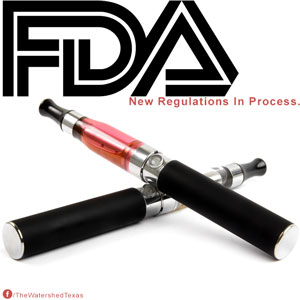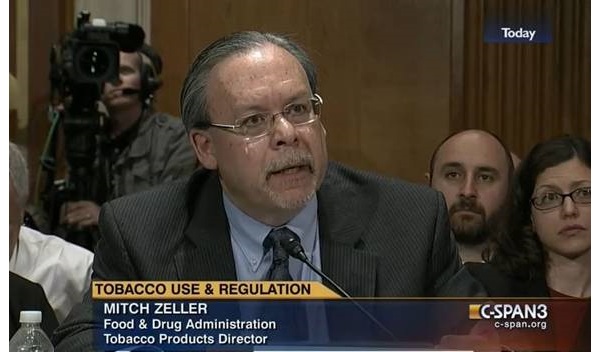 The FDA kept us in suspense for a long time before releasing their deeming regulations. There was understandable fear that they’d give too much credence to unproven notions of “gateway effects” or threaten to ban flavors because they “appeal to youth,” but the core concern was that their regulations would impose such stringent requirements on manufacturers that they would essentially be put out of business.
The FDA kept us in suspense for a long time before releasing their deeming regulations. There was understandable fear that they’d give too much credence to unproven notions of “gateway effects” or threaten to ban flavors because they “appeal to youth,” but the core concern was that their regulations would impose such stringent requirements on manufacturers that they would essentially be put out of business.
In the draft regulations, the latter concern was emphatically confirmed, and the agency repeatedly requested evidence to justify further draconian measures to limit things like flavors. As part of the legislative process, proposals such as this are open for a 75-day public comment period, which is set to end on July 9th.
Since our first post on the regulations, there have been several notable comments, from both sides of the debate, and groups such as CASAA have requested that the comment period be extended, but it’s still unclear what the outcome is going to be.
Summary
- CASAA has released three calls to action. The first of these requests and extension of the comment period on the legislation, the second draws attention to the inaccurate reporting of the paperwork burden on businesses and the third shines the spotlight on the misinformation spread about e-cigs by the CDC and FDA.
- The comment period remains open until at least July 9th, and the FDA has said that it’s considering calls for an extension to the deadline. This may not be announced until fairly close to the date, however.
- Stanton Glantz’s group has questioned the existence of a “continuum of risk” in nicotine products (denying e-cigs are safer than smoking) and proposed extensive restrictions on marketing under the guise of protecting the children.
- The CDC’s Tim McAfee has said e-cigarettes have only “hypothetical” benefits to adult smokers and that their marketing is a “huge experiment” on our children. Numerous senators have also expressed concern to the FDA based on over-interpretations of the recent formaldehyde study.
- Mitch Zeller, director of the FDA’s Center for Tobacco Products, admits that there is potential for gains to public health from e-cigarettes, but believes that this has to be in a regulated environment, although the regulations so far consist of little other than paperwork.
- There is some indication that the FDA is working on some specific product standards for e-cigarettes, but why this wasn’t a priority during the three years they’ve been working on the regulations isn’t clear.
FDA E-Cig Regulations Background
Although some of the potentially idiotic courses of action have been avoided to date, there was very little to be happy about in the initial draft of the FDA regulations. To sum it up in a single sentence: it uses a cherry-picked and largely misinterpreted body of evidence to justify excessive bureaucratic and financial requirements that would put the majority of companies (not counting the few that happen to be owned by tobacco companies) out of business. If you’re curious about the adequacy of the scientific analysis, Carl V. Philips has combed through many of the scientific claims, and along with the uncritical acceptance of anti-e-cig arguments in published literature and flagrant ignorance of positive findings, the FDA spends a disconcerting amount of time requesting for data during the comment period. CASAA counted 99 such requests. The document reads like they want a reason to ban flavorings, for example, but have no evidence even they are willing to cite to justify such actions.
Our summary of the proposed regulations goes into more detail, if you’re unfamiliar with the changes. CASAA also has a useful introductory post explaining the basic background the regulation, notably addressing the fact that although in our common understanding of the term “tobacco product” (which the FDA is “deeming” e-cigarettes) doesn’t seem to apply to e-cigarettes, the legal definition of the term almost definitely does. This is well worth reading if you’re unfamiliar with the legal process.
CASAA Calls to Action
The comment period is crucial to vapers, who are understandably pissed off at the proposed restrictions that run contrary to the current body of scientific evidence. CASAA has long been the main organizing body for vapers hoping to stand up for their right to vape, and they’ve formulated a few “Calls to Action” to advise vapers on the best ways to go about opposing the legislation.
 The first step in CASAA’s suggested plan is to request an extension to the 75-day comment period, asking for an extension of 105 days making the period 180 days in total. The reasoning behind this is that the FDA took several years to put together the rule, but in the 241-page document, made 99 requests (according to CASAA, although others have counted 50, admittedly grouping some together) for information and evidence on reduced harm products. Expecting significant numbers of ordinary consumers to be able to respond to even a tenth of the questions raised within 75 days is quite the ask, and the FDA – having taken over three years to review the evidence and release the regulations – are well-aware of the time it takes to research these issues. CASAA points out that issuing an extension is within the FDA’s power and they’ve done so in the past. Other groups such as SFATA and AEMSA are encouraging their members to request the same extension.
The first step in CASAA’s suggested plan is to request an extension to the 75-day comment period, asking for an extension of 105 days making the period 180 days in total. The reasoning behind this is that the FDA took several years to put together the rule, but in the 241-page document, made 99 requests (according to CASAA, although others have counted 50, admittedly grouping some together) for information and evidence on reduced harm products. Expecting significant numbers of ordinary consumers to be able to respond to even a tenth of the questions raised within 75 days is quite the ask, and the FDA – having taken over three years to review the evidence and release the regulations – are well-aware of the time it takes to research these issues. CASAA points out that issuing an extension is within the FDA’s power and they’ve done so in the past. Other groups such as SFATA and AEMSA are encouraging their members to request the same extension.
The second call to action addressed what is realistically the most crucial point: the paperwork burden associated with the proposed regulations. The deadline for these comments has passed, but the point is that the FDA either hasn’t used appropriate estimates for the paperwork costs of the regulation or has tacitly admitted that the vast majority of products will definitely be driven from the market. They estimated that only 25 pre-market applications will be submitted in connection with e-cigarettes, a figure drastically lower than the number of sellers or individual products available today. They calculated the paperwork burden of the regulations using this figure, completely ignoring the impact on the vast majority of companies, which they assume won’t even attempt (or be able to attempt) to gain approval for their products. There is no doubt that this would negatively impact consumers, a fact which was acknowledged but not taken into account by the FDA.
This argument is excellently conveyed by Carl V. Philips in CASAA’s comment to the Office of Information and Regulatory Affairs. The regulations do not suggest manufacturing standards or ban certain ingredients; it looks as though they’re attempting to crush the industry under mountains of paperwork while providing zero benefit in terms of product safety. The only reason a specific device wouldn’t be available wouldn’t be its safety profile, just that the independent business selling it can’t feasibly dedicate 5,000 hours per product to file the paperwork. The truly irritating thing is that by hiding this huge burden, they’re arguably pushing for a covert ban. It’s not a “ban,” technically, it’s just a “you can only make e-cigarettes if you’re a large business with a substantial workforce. We know most of you aren’t, but we don’t care.” The U. S. Small Business Administration’s Office of Advocacy has submitted a comment on these issues too, after receiving many comments from affected small businesses.
The most recent call to action is primarily concerned with the abundant scientific inaccuracies in the FDA’s draft proposal and more broadly, the campaign of misinformation surrounding e-cigarettes by groups like the CDC. The proposed action for vapers is to sign a letter to this effect and edit it with their own vaping story, which you can do through a simple online system set up by CASAA. The aim is to ask your federal legislators to call for congressional hearings to investigate the misinformation being spread by the FDA and CDC. If this seems an extreme stance, CASAA has called attention to some of the issues in their submission to the Senate Committee on Health, Education Labor and Pensions, and a cursory glance through the post history on sites like Anti-THR Lies, the Rest of the Story and even this blog will make the problems unavoidably clear. The CDC and FDA seem intent on reducing the availability of e-cigarettes, and in order to pursue this goal they are willing to warp the scientific data as they see fit. This represents nothing short of blatant and willful misleading of the American public.
This is all CASAA has suggested to date, but further calls to action are expected in the near future. Thus far (as expected, considering the circumstances) vapers have been even more active in opposing these regulations than usual, and there are currently around 32,000 comments registered as received on the proposal at regulations.gov. However, this was previously over 50,000, but it’s unclear what the real number is, due to delay in comments being registered on the site and this fluctuation in numbers. It could have been that the bigger number was only displayed due to technical problems, according to agency contact May Nelson.
Extending the Comment Period
The response we really need related to whether the comment period will be extended. The only indication thus far is a suggestion that the FDA is considering it. If they do decide to extend the comment period, it probably wouldn’t be announced until fairly close to the stated deadline. Until then, it’s worth pointing out that there is no “one comment only” rule, so while you should carefully consider what you say, don’t feel like you only have one comment in which to convey all of the problems you have with the proposals or to answer the questions posed.
Unsurprisingly, not everyone is happy about the request for an extension. Stanton Glantz and colleagues submitted a comment to the FDA on the topic under the familiar rallying-call of “think of the children.” The argument is that in the additional 105 days, based on the CDC survey of youth e-cig use, over 26,000 youths (in Glantz’s estimates, this is anyone aged from 10 to 19) would try e-cigarettes in this time. This is a bewildering argument of the sort we’ve come to expect from Glantz, claiming a health risk to extending the comment period despite the fact that the vast majority of these “youth” experimenters (they only had to have tried vaping once to be counted) were smokers anyway, and implying that this “risk” is so important that we can’t possibly wait any longer to institute the changes. Unsurprisingly, he doesn’t mention (or account for) the number of states with these rules already in place.
The Crazies Get to Play Too
Of course, the ANTZ get to make use of the comment period too, and they’re generally unhappy that the more obviously draconian potential rules (like bans on flavors) weren’t included in the regulations. A group of senators has sent a letter to the FDA explaining the results of the recent formaldehyde study and claiming that this is significant reason to come down strongly on e-cigarettes to prevent bystanders from being exposed. The study only found cigarette-like levels of formaldehyde under unrealistic usage conditions (with very little at normal power levels), but this isn’t much of a concern for the senators, who cry “danger” despite this just being one of 70 carcinogens found in cigarette smoke.
Glantz’s group has also published more comments advancing their uniquely deluded viewpoints on e-cigarettes. Among these is one comment questioning the very reasonable prospect of a continuum of risk of nicotine-containing products, arguing that there is no justification for saying products such as e-cigarettes are safer than tobacco cigarettes. This is an extremely unreasonable suggestion (which Dr. Michael Siegel argues would be classifiable as malpractice in a doctor-patient scenario), but one that undoubtedly plays into the FDA’s willful refusal to acknowledge this fact in the draft regulations. If, as Glantz asserts, there is no “continuum of risk,” this would also mean that nicotine-containing patches and gums are also just as damaging as tobacco cigarettes, but he doesn’t draw attention to whatever doublethink allows him to ignore that profound contradiction in his views.
They’ve also sent a “think of the children” comment as well, going through the usual nonsense to justify proposing a series of extreme measures like banning pretty much all e-cigarette advertising, banning all flavors and stopping manufacturers from making “indirect health claims.” Indirect is a puzzling term to use, assumedly meaning that they are against various methods of telling the truth: if I say “e-cigarette vapor contains only a fraction of the toxins in cigarette smoke, and any present are found in vastly smaller quantities,” this must be an “indirect” health claim. It’s completely consistent with everything we know, but they allege that such claims should be banned because they may be used to infer a health benefit. These people don’t care whether the claim is true, or whether such an inference is valid and e-cigarettes could save millions of lives, they just don’t want any positive information to be available. They are dicks, plain and simple.
Similarly idiotic comments were made by Tim McAfee, the director of the Office on Smoking and Health at the CDC at a senate hearing on the issue. The hearing was announced at the last minute, and only McAfee and the director of the FDA’s Center for Tobacco Products, Mitch Zeller, were invited to speak. McAfee called e-cigarette marketing a “huge experiment” and said that “it is not fair to our children to ask them to pay a potential price […] for a hypothetical benefit to adult smokers.” Claiming the benefits to adult smokers to be “hypothetical” is beyond outrageous, because the benefit is very real. As CASAA argued, the CDC truly has begun spewing misinformation from every orifice.
Is Mitch Zeller Being More Reasonable?

At this same hearing, Mitch Zeller actually was a little more level-headed. He commented that “they have the potential to do good, and they have the potential to do harm […] It really depends on who is using them and how they’re being used.” He said that for smokers who are unable or unwilling to quit, switching to vaping is a good thing, but if they’re discouraged from quitting then it might not be good for public health. This isn’t exactly positive, but at least it isn’t wholly negative. The evidence shows that dual use generally results in reduced cigarette consumption or eventually quitting, and he doesn’t acknowledge or appreciate this, but even the minor, conditional positive comments (“I would absolutely concede that any of these products at an individual level can do good,” for example) are better than the impression you get from reading the draft regulations.
This month, Zeller commented that they were working on developing product standards for e-cigs, and speaking at an American Legacy Foundation event he commented that it’s the delivery mechanism, not the nicotine, that kills smokers. He wanted people to have an open mind, and notably said:
“We share the concerns that flavors certainly look like they would be appealing to kids; but let's not lose sight of the bigger picture here–tobacco use remains the leading cause of preventable death and disease principally because of the ongoing use of products that burn tobacco.”
This is exactly the sort of thing we want to hear, but the official draft proposal is the most reliable indicator we have of what is going to happen, so it’d be foolish to expect too much of a change. And accordingly, he continued:
“If there's some kind of emerging technology (e-cigarette or otherwise) in a regulated environment, I think we have to have an open mind on the potential of these emerging technologies to benefit public health.”
By “regulated environment,” we can only assume he means something like the initial proposals. Reasonable comments mean nothing if you’re still going to go ahead and destroy the majority of the industry with meaningless paperwork. The FDA has thus far taken no reasonable action on e-cigarettes, and a glance at their public health focus webpage on e-cigarettes confirms that the official messages are still a scaremongering, science-free zone.
Conclusion – Keep Commenting, but it Could be in Vain
The situation is still depressing. There are glimmers of good news, but the core problem is that the FDA, which claims to stand for “science-based regulation,” seems incapable of drawing even the most basic of conclusions: e-cigarettes, regulated or unregulated, are vastly safer than tobacco cigarettes and should be treated as such. The complex issue they’ve been mulling over for years is depressingly simple: there is no dispute about their relative safety, no evidence of a “gateway” effect and plenty of reason to think they help people quit smoking in significant numbers. We should obviously continue to stand up for our right to vape, but when the FDA appears incapable of coming to the only possible conclusion from the current body of evidence and acting accordingly, I get the depressing feeling that it will all be in vain.

